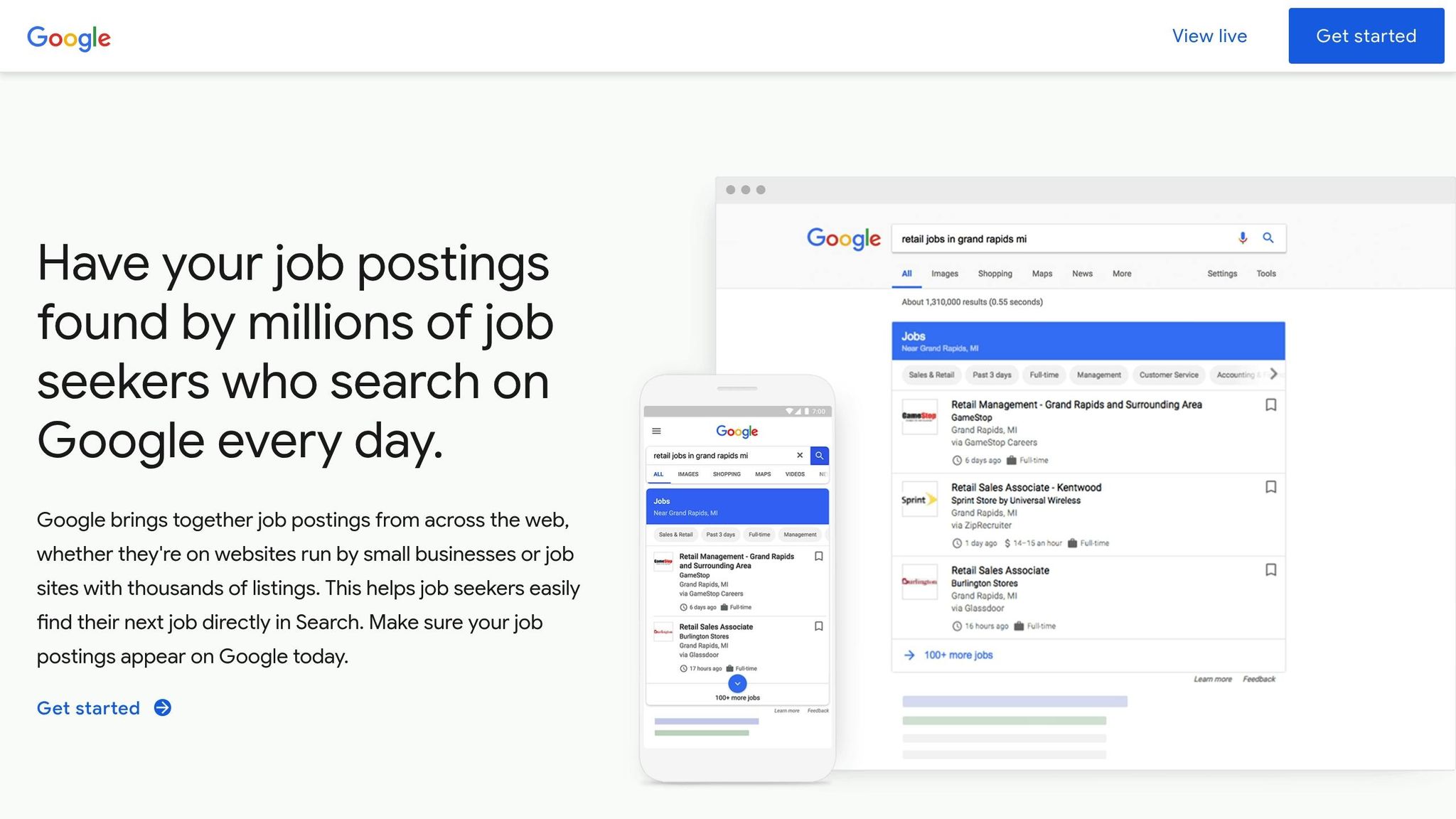How Google Jobs UX Changes Will Impact Job Boards
In a rapidly evolving job board landscape, few developments carry as much weight as changes to Google Jobs' user experience (UX). Whether you're running a small niche job board, a recruitment marketplace, or looking to get started in the industry, understanding how these shifts will impact your business is critical. In episode 51 of the Inside Job Boards and Recruitment Marketplaces podcast, hosted by Steven Rothberg and Peter Zolman, special guest Alex - a leading AI expert in recruitment - dives into Google Jobs' latest updates and their implications for the industry.
This article distills their insights into actionable takeaways for entrepreneurs, small business owners, and independent creators. From analyzing the competitive dynamics of Google's pivot to paid job ads to exploring how AI will shape recruitment in the coming years, we break down what you need to know to future-proof and grow your platform.
A Quick Overview of Google Jobs’ UX Changes

Google has begun testing significant changes to its Google Jobs interface. While not yet universally rolled out, these updates are already visible in parts of Europe and are expected to expand globally. Here are the key changes:
- Reduced Real Estate for Job Listings: Google Jobs now occupies approximately 40% less screen space in search results, making it less prominent.
- Removal of Bookmarking Options: Users can no longer save jobs for later directly from Google Jobs.
- Elimination of Job Alerts: The ability to set up job alerts - previously a major driver of user traffic - is no longer available.
- No Filters or Categorization: Google has removed features that allowed users to drill down into jobs by category or related titles.
- Phasing Out "Find Similar Jobs" Links: In some regions, Google has removed links that direct users to external job boards.
These changes appear to align with Google’s upcoming launch of Google Job Ads, a paid advertising platform that will allow companies and job boards to sponsor their listings directly on Google, similar to shopping ads.
Why Is Google Making These Changes?
Alex explains that these updates are part of Google's broader strategy to monetize job search traffic. Historically, Google Jobs provided free visibility to job boards by featuring their listings prominently in search results. However, by reducing this free exposure, Google is paving the way to introduce paid job ads, creating a new revenue stream.
Much like Google’s product ads, the job ads will likely feature sponsored tiles for listings from platforms like ZipRecruiter, Indeed, and LinkedIn. This shift enables Google to capitalize on the recruitment advertising market while reallocating search result space away from organic listings.
The Implications for Job Boards
1. Declining Organic Traffic
For job boards that rely heavily on Google Jobs for traffic, these changes could result in a significant drop in visibility. Alex estimates that traffic reductions of at least 20% are likely, especially for platforms that have invested in optimizing their Google Jobs presence.
With features like job alerts and categorization filters gone, user engagement within Google Jobs is also expected to decline. This means that job boards will need to seek alternative ways to attract and retain users.
2. Increased Competition for Paid Ads
The introduction of Google Job Ads will create a new competitive dynamic. Larger job boards with bigger budgets will likely dominate these paid placements, potentially crowding out smaller players. However, niche job boards with highly targeted audiences may still find opportunities by offering value that broader platforms cannot replicate.
3. The Need for Innovation
As free traffic from Google Jobs becomes less reliable, job boards must innovate to maintain their relevance. This could include:
- Building Unique Value Propositions: Focusing on specialized niches or underserved markets where larger players cannot compete effectively.
- Investing in Direct Traffic Channels: Leveraging content marketing, social media, and email campaigns to drive organic traffic.
- Enhancing User Experience: Offering features such as advanced filtering, personalized job recommendations, and community engagement that Google no longer provides.
The Role of AI in the Future of Recruitment Marketplaces
Beyond the immediate impact of Google’s changes, Alex also highlights a broader trend reshaping the recruitment industry: the increasing role of artificial intelligence (AI). Here’s what entrepreneurs should watch for:
1. Demand for Quality Metrics
As AI-powered tools make it easier for candidates to apply to multiple jobs simultaneously, employers are increasingly scrutinizing the quality of applicants. Job boards will face pressure to demonstrate that their traffic delivers high-quality candidates rather than just high volumes.
Alex notes, "Employers will start asking, ‘Why are you sending us these people, and how can you help us improve applicant quality?’" This feedback loop, largely absent in the past, will become a critical factor in evaluating job board performance.
2. AI-Driven Customization
AI tools are already shaping how candidates and employers interact with job boards. For example, AI-based résumé customization tools are gaining traction, enabling candidates to tailor their applications to specific job postings. While this innovation can improve application relevance, it also raises questions about authenticity and over-automation.
3. Preparing for the Long-Term Impact
Alex predicts that within the next three years, AI will fundamentally change user expectations in the job board space. Platforms that fail to integrate AI-driven features such as predictive job matching, candidate scoring, and automated applicant tracking risk falling behind.
How Entrepreneurs Can Adapt and Thrive
For aspiring or current job board operators, these changes represent both a challenge and an opportunity. Here are practical steps to future-proof your business:
- Diversify Traffic Sources: Reduce reliance on Google Jobs by building traffic through SEO, social media, and partnerships.
- Capitalize on Niche Markets: Specialize in a specific industry or demographic to differentiate your platform.
- Leverage AI Tools: Invest in AI-driven features to improve user experience and demonstrate value to employers.
- Monitor Industry Trends: Stay informed about Google’s rollouts and adapt your strategy as new features become available.
Key Takeaways
- Google Jobs is testing UX changes, including reduced real estate, removal of job alerts, and elimination of bookmarking features.
- These updates aim to pave the way for Google's paid Job Ads platform, which will monetize job listings.
- Job boards relying on Google Jobs for traffic may see a significant decline in organic visibility, necessitating diversification of traffic sources.
- AI is transforming recruitment, with increased focus on application quality and customizable tools for employers and candidates.
- To thrive amidst these changes, entrepreneurs should focus on niche markets, enhance their value propositions, and integrate AI-driven features.
Final Thoughts
The job board industry is at a turning point. As Google shifts from free exposure to a paid advertising model, and AI reshapes how recruitment operates, the need for innovation has never been greater. For entrepreneurs, these changes are a call to adapt swiftly and strategically. By staying ahead of market trends and leveraging new technologies, job boards can not only survive but also thrive in this evolving landscape.
The future of recruitment marketplaces belongs to those who are prepared to innovate. Are you ready?
Source: "Breaking News: Massive UX update hits Google Jobs" - WRKdefined Audio, YouTube, Oct 8, 2025 - https://www.youtube.com/watch?v=3Z6teLqQQdM
Use: Embedded for reference. Brief quotes used for commentary/review.
